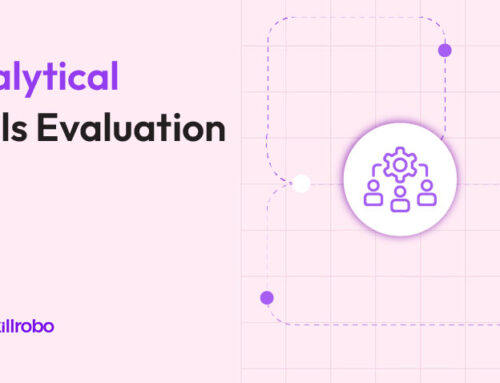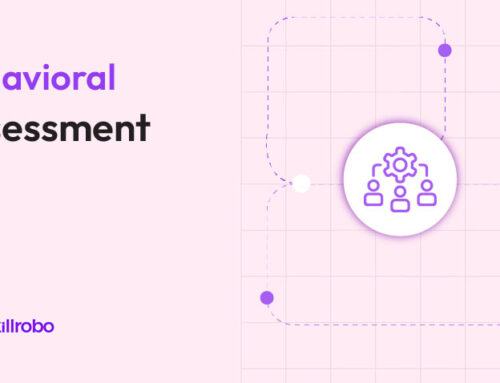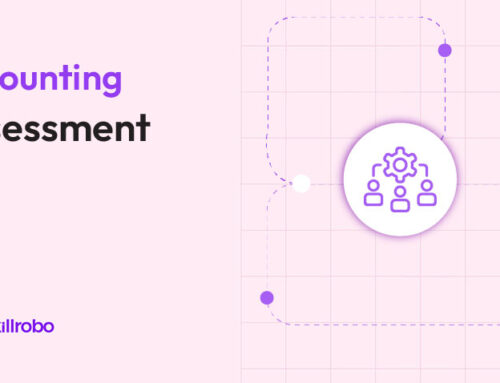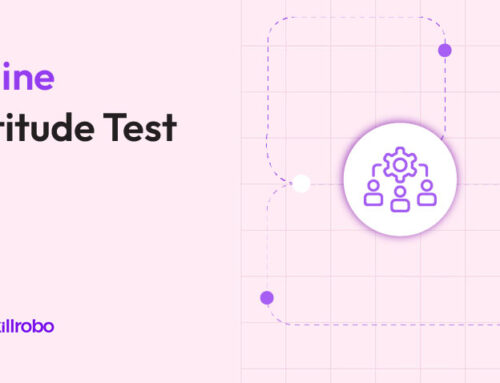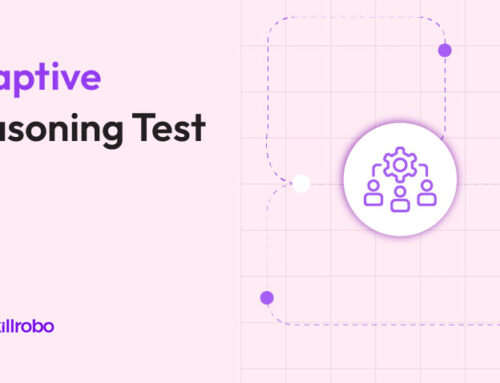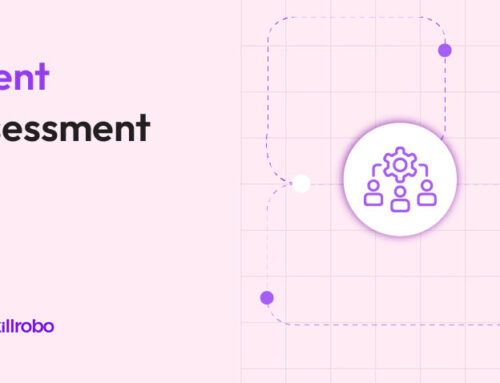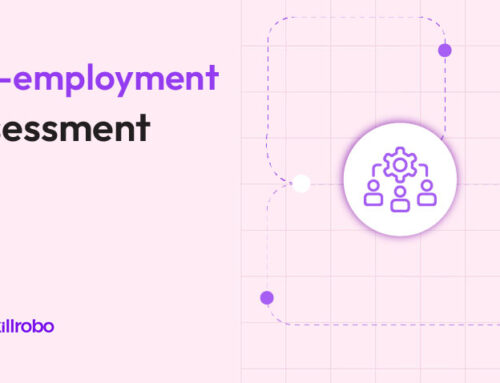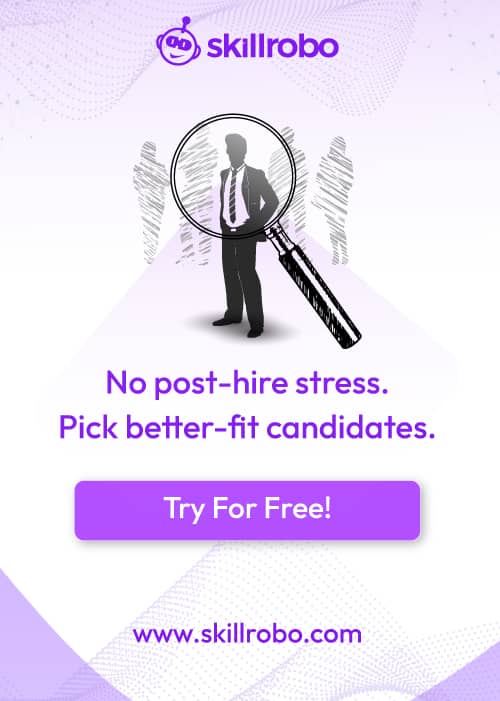Table of Contents
- Key Takeaways
- What are Candidate Assessment Tools?
- Who Uses Pre-Employment Testing Software?
- Why Use Candidate Assessment Tools?
- Benefits of Candidate Assessment Software in Recruitment
- Types of Candidate Assessment Tools
- How to Use Candidate Assessment Tools?
- Choose the Right Type of Assessment Tool
- Important Features in Candidate Assessment Software
- Top 10 Best Assessment Tools for Recruitment
- Conclusion
Related articles
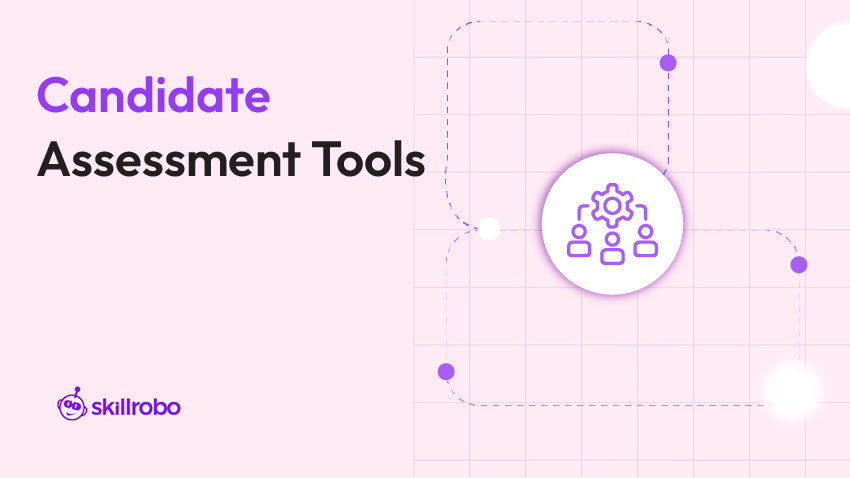
Key Takeaways
-
Candidate assessment tools streamline hiring by objectively evaluating skills, experience, and personality, reducing bias and improving hiring accuracy.
-
Organizations using pre-employment assessment software report faster hiring cycles, higher retention rates, and better candidate-job fit.
-
Choosing the right tool matters—factors like integration capabilities, customizable templates, anti-fraud features, and skill-specific tests can significantly impact hiring outcomes.
-
Skillrobo offers a comprehensive solution for creating customizable assessments, tracking candidates efficiently, and ensuring a seamless hiring process across industries.
New technologies are redefining how hiring processes are carried out. There has been an exponential increase in the number of applicants applying for a single job posting, making it difficult for hiring managers to hire the best. Employers constantly look for ways to attract the best-skilled candidates to suit the role perfectly. This laborious task has been greatly simplified by implementing candidate assessment tools.
These tools, which are specialized in filtering out suitable candidates, stand as a one-stop solution for any hiring process across any industry. Today, candidate assessment software has become a must-have, no matter the size of your organization. Let us dig further to know how to implement and use one effectively.
What are Candidate Assessment Tools?
In the current scenario, the hiring managers no longer sit for long hours to scan through CVs. With advanced products like candidate assessment tools, the complexity of the process has been reduced to a great extent, making the hiring process faster than before.
So, what is a candidate assessment tool?
A candidate assessment tool is a pre-employment screening software that is used to aid hiring managers in efficiently shortlisting and choosing the best candidates for a particular job role. As an assessment software, it allows users to examine and filter applicants based on the results obtained from the tests. The following grounds can be assessed through a given candidate assessment test:
- Skillset
- Mindset
- Personality
- Character
- Work experience
- Knowledge
- Education
These hiring assessment tools deliver a variety of features that cover a wider range of cognitive abilities and personality tests that will help gauge the candidates’ ability to contribute to the company’s growth. Pre-employment testing tools exponentially increase precision in hiring and decrease errors and expenses.
Who Uses Pre-Employment Testing Software?
Any organization, small or large-scale, that is struggling to find the right fit for the job roles can implement pre-employment testing software. An assessment tool like this would streamline the recruitment process, elevating and optimizing the complete experience of hiring. A systematic and standardized approach is summoned and lets organizations land on the right candidate.
Why Use Candidate Assessment Tools?
Candidate assessment software comes with multiple advantages. These advantages enable the recruiters to comprehend the abilities of each candidate, rank them accordingly, and go for the final selection. 82% of U.S. companies use some form of pre-employment testing to assess candidates’ skills and personality traits. Hence, here are some reasons why it is essential to adopt a candidate assessment tool for hiring:
1. Conventional CV Screening is Pointless
Years before, the number of candidates that applied to a job opening was few and limited, and the segregation of applications was done by the recruiters themselves. It was possible to invest a long period in doing so. But today, there has been a steady rise in the number of applicants, and human screening is no longer applicable. Candidate assessment tools can easily do that for you. Instead of just glancing at the CVs, let the software do the appropriate level of detailed screening and find the right candidate.
2. Removes Biases and Focuses on Skills
It is an undeniable fact that biases affect the efficacy of filtering applicants. But when the filtering is achieved using pre-employment tests, the candidates are only graded based on their skills and experience. This can be achieved easily as the metrics will be set in the software, thus removing any sort of biases. This enables the process to be more reliable and legitimate. Finding the right applicant is always crucial to extracting the maximum proficiency for the role.
3. Confidence in the Hiring Process
A pre-employment assessment tool will provide you with accurate assessment results and values so that your company’s hiring manager will have the confidence to choose the right candidate. No accusations can be made against them or the company. It is all based on the performance of the candidates alone.
4. Develop a Strong Team
Since the focus is completely on the candidate’s skills, a robust and diverse team can be built using the candidate’s data. At the same time, the candidate’s strengths and weaknesses can be studied and accordingly placed in the right team. This way, a suitable candidate is placed on the right team, which further boosts the performance.
5. Managers can successfully prepare
When the candidate data is available to the team manager, they can clearly understand what the candidate can or cannot do. This way, the candidate can be appointed to the appropriate job role and team.
Benefits of Candidate Assessment Software in Recruitment
Companies that automate candidate assessments report a 24% reduction in overall time-to-hire. Several benefits come with candidate assessment tools. If you aim to locate and land the right candidate for your organization, candidate assessment software can simplify the process for you. Let us dive into some of the important benefits that you acquire with a candidate assessment tool.
1. Improved Employee Retention
With a recruitment tool, you can always focus on recruiting suitable candidates. These candidates who are the right fit for the role tend to be productive as they understand their job roles with utmost clarity. Hence, the chances of their retention are high.
2. Saves Time Spent on Recruiting
The tool will guide employers to shortlist the most suitable candidates instantly after the test. Hence, the entire recruitment process improves and is completed faster. This saves a lot of time and energy and simultaneously enhances accuracy in the process as well.
3. Zero Biased Assessment
As discussed above, a pre-employment test focuses on the candidates’ skills and other factors like qualifications, experience, and cognitive abilities. With these parameters as the criteria, it is data-driven, and there is zero chance of bias.
4. Screen More Candidates
One of the greatest advantages of using pre-employment software is its ability to screen a large group of candidates simultaneously. Eventually, only the candidates who clear the test will be considered for the interviews that follow.
5. Improved Productivity
When the most skilled and apt candidates are finally part of the team, the employee engagement rate heightens which further pushes the productivity of the team.
6. Highly Cost-Effective
The amount of resources used falls drastically with the implementation of a candidate assessment tool. The test is bought only once by the organizations. This can be distributed and used among hundreds of users and applicants. Built-in tests are readily available, and even new tests can be created from the elements available in the software itself. Employers do not have to access anything from any other source. Hence, it is highly cost-effective.
7. Scalable Solution
The hiring assessment tools are highly scalable. Let the number of candidates be 10 or even 100, these can be used effectively by just sharing the test link with the candidates. The process is escalated to a high speed that the hiring manager finds it easy to find the right employee with high precision.
Types of Candidate Assessment Tools
Candidate assessment software is one of the most flexible hiring assessment tools that can be used for recruiting the best candidates across any industry. Different kinds of pre-employment assessment software can cover a wide range of job-related skills and soft skills, including areas like problem-solving abilities, motivation, communication, etc. Some of the most common types of candidate assessment tools are as follows:
1. Skills Tests
The skills tests are assessments that are specifically used for assessing the role-based skills of the candidates. According to each role, the skill sets to be judged change. For example, for programmer-based roles, the candidates are assessed based on their programming language skills. Similarly, for the role of a content writer, the candidates will be assessed for their writing skills. This will give the hiring managers deep insights into the abilities of a candidate.
2. Personality Tests
A pre-employment assessment test can measure the candidate’s personality traits along with the performance of a job-related role. When working in any role, it is important to hire a person with good personality traits so that they will match your organizational culture.
3. Integrity Tests
As a type of personality test, integrity or honesty tests are most commonly used in the retail and financial service industries. This is generally used to ensure integrity since, in these industries, employees are left unsupervised and they might have access to the products or handle cash.
4. Soft Skills Tests
In soft skills tests, assessments based on communication, work ethics, problem-solving abilities, flexibility, and adaptability, etc., are carried out.
5. Aptitude Tests
Aptitude tests are similar to soft skills tests. These measure similar criteria like problem-solving, attention to detail, and the ability to analyze and process data and information. These types of tests offer a deep understanding of a candidate’s behavioral traits.
Skillrobo, our online pre-employment assessment tool with 100+ pre-built tests, is one of the best candidate assessment software tools, which offers a combination of all of the above-mentioned assessments.
How to Use Candidate Assessment Tools?
The recruitment assessment tools are best for organizations that practice quantifiable and objective methods of candidate screening, unlike most of the other traditional methods, like interviews, but they carry some drawbacks too. Hence, choosing the right combination of tests, conducting methods, as well as the right tools is essential.
Most often, several limitations like personality tests being considered a privacy invasion, or tests being discriminatory. Hence, using a pre-employment tool combined with the right methods of conducting the entire recruitment process, like the structured interview, is the best practice.
Possible Issues with Candidate Assessment Software
No recruitment software can be used blindly. Several aspects need to be considered before choosing and implementing one. In most hiring assessment tools, certain types of drawbacks are prevalent, and you need to be aware of them. Here are some common problems associated with candidate assessment.
1. No Objective Scoring
One common pitfall is when the software does not provide objective scoring for the assessments that are done. In the absence of an objective answer type, bias is most likely to be involved in the assessment process. Choosing a tool that offers no objective scoring and quantifiable results will fail you in screening the most suitable shortlisted candidates for you.
2. Assessing Video Responses
Not everything can be performed by software. Video responses are not an objective type of response. So features like video responses have to be assessed by a human only. From a video response, factors like speaking skills, energy level, motivation, and creativity can only be judged and assessed by a human.
3. HR Manager vs. Automation
First-time implementers often think that candidate assessment tools are a complete replacement for hiring managers. What they fail to understand is that these hiring assessment tools are not a replacement for hiring managers. Recruitment tools cannot automate every aspect of the hiring process. Most processes often need human initiation and judgment. Similarly, human intervention is inevitable in the hiring process, too. Automation aids in the process so that the recruiters can focus on important matters. Automation can take care of tasks like integration with other applications, distribution of the tests, and calculating the overall result of the test.
4. Having a Feedback System
What most software leaves out is a feedback provision within it. If you want to ensure a good candidate experience, then a feedback system is essential to maintain a good recruiter image and brand. With a feedback system, your organization can also improve the areas that are lacking or even make necessary changes to the software.
5. Laws Related to Personality Tests
It is unlawful to refuse to hire any candidate due to their race, color, nationality, sex, or religion. Even though the act does not prohibit employers from using personality or integrity tests, you must be aware that the decree is relevant when these tests are used to intentionally negate or discriminate against any person based on any grounds or expert advice on such matters, consider speaking with a legal consultant who specializes in employment law.
6. Race and Gender Discrimination
It is also illegal for an employer to tamper with the results by changing the scores, misusing the power and changing cutoffs, or altering the result based on the color, sex, race, religion, or nationality of a candidate.
7. Psychological Tests termed “Medical Examinations”
Based on guidelines provided by the U.S. Equal Employment Opportunity Commission (EEOC), employers are allowed to conduct psychological tests provided it is not deemed as “medical”. Psychological tests often turn medical when clinically based personality tests are developed to determine issues like depression or paranoia. This should not be used on candidates. It is always better to stick to personality and psychometric tests that study cognitive abilities to focus on the personality of the candidates.
8. Privacy of the Candidates
Most of the time, recruitment tests have been questioned for the invasion of privacy. This is a huge concern. The tests that employers conduct should not be too intrusive and should only be job-specific.
Choose the Right Type of Assessment Tool
Looking at the potential issues that could arise when using recruitment software, it is important to choose the right tool for this process. Technical hiring is completely different from regular hiring. The parameters are purely based on the skills, experience, and knowledge of the applicants. To carry this out perfectly, a proper tool that is flexible and capable of being inclusive with different tests has to be chosen. Doing so will make it easier for you to focus on filtering the right candidates.
Choosing a tool can be based on different criteria, and this can vary from organization to organization. Among them, one criterion can be choosing a tool based on a skill that you are assessing.
For example, if you are looking for coders, then you can choose tools that are specifically designed to examine coding abilities. Similarly, for sales executives, respective hiring assessment tools that support sales for tests can be implemented. To understand and choose the best one, it is important to familiarize yourself with the common features.
Important Features in Candidate Assessment Software
Every pre-employment software contributes a different set of features to its users. Here are some of them to have an idea about some basic features.
1. Prebuilt Test Templates and Skills Challenge
Most of the hiring assessment tools support readily available test templates in the software. These in-built test templates with predetermined patterns of questions will aid the hiring managers in the shortlisting process. They can save time by avoiding sitting and choosing questions for the test.
2. Customizable Templates
An additional advantage most platforms offer is the customization of these templates or skill challenges. The feature of customization can be used to change question patterns and types, or even alter the difficulty level according to the expertise and experience of the candidates.
3. Integration
Integration is a crucial aspect when it comes to online assessment tools. Employers often use external software like Applicant Tracking System (ATS), applications for automated emails, background screening, and several others. The users must be able to use all of these together seamlessly. To achieve this, it is mandatory to go for a tool that allows integration.
4. Built-in ATS
Skillrobo is a platform that has a built-in Applicant Tracking System. This makes the streamlining much simpler, and employers do not have to look for a good tracking system. Opting for Skillrobo will provide you with everything in one place.
5. Expert Guidance
Some platforms offer specialized experts to guide HR managers/professionals in constructing an effective job assessment workflow for specific roles.
6. Pricing
The tool must be cost-effective. You have to check whether you are paying for the right features that complement your organization and the hiring process. Look for tools that will acquire the required talent pool that you are looking for.
7. Hiring at Scale
An effective hiring tool must be able to improve your hiring scale and simultaneously build a skilled and professional workforce for your organization. With such a tool in place, you can increase the volume of candidates to undergo initial shortlisting and allow you to focus on interviews.
8. Anti-fraud Mechanism
An assessment tool must be able to have an in-built anti-fraud mechanism to prevent cheating while conducting the tests. This feature will ensure credibility and fairness as it negates malpractices like plagiarism, impersonation, sharing answers, or any fraudulent activities. An anti-fraud mechanism will allow the recruiters to practice advanced proctoring of the tests.
Some other additional and essential features include:
- Different types of tests within a single software
- Offers exceptional candidate experience
- Availability of important and common metrics and crucial analytics features
Top 10 Best Assessment Tools for Recruitment
Explore the top 10 best candidate assessment tools for an elevated recruitment experience.
1. Skillrobo
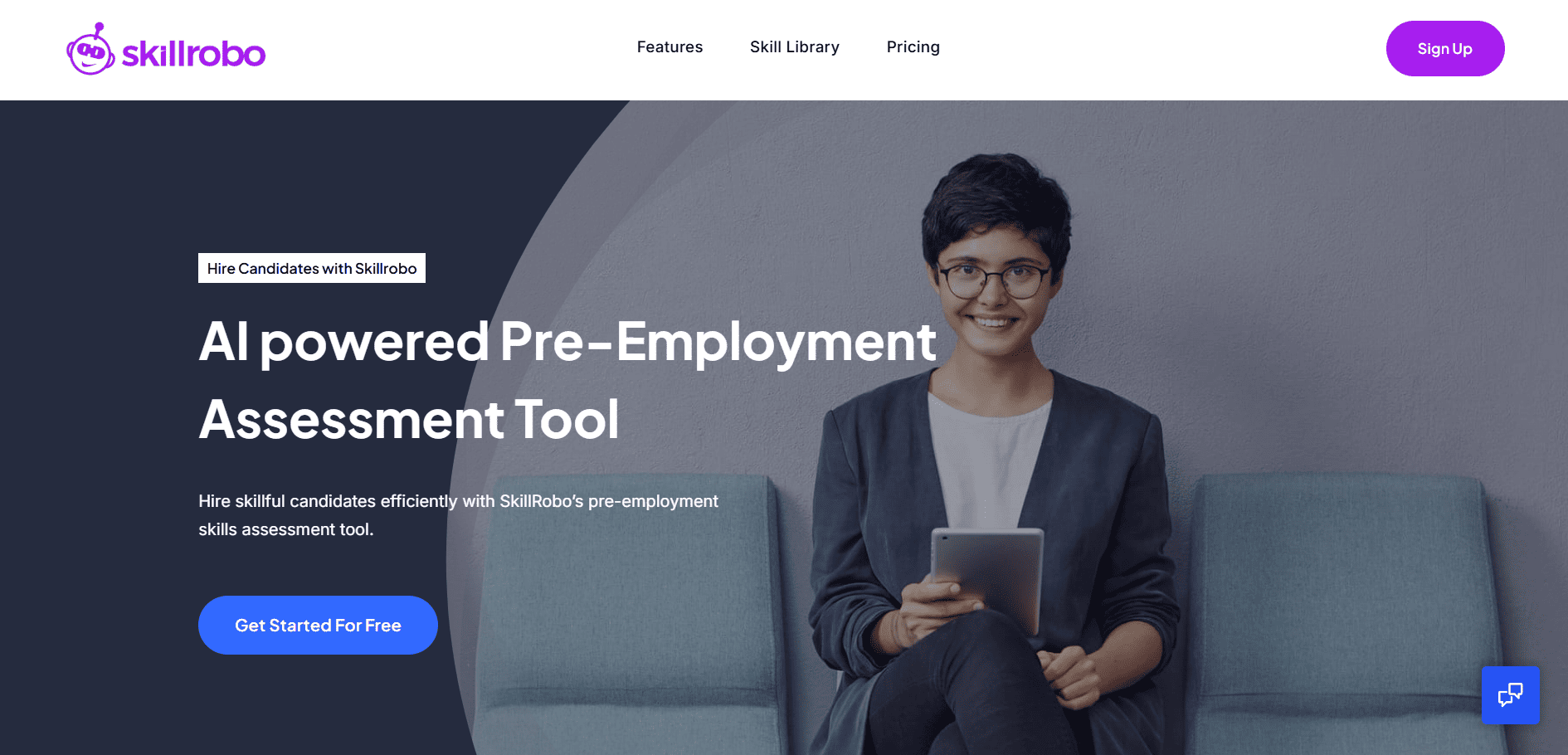
Skillrobo is the best candidate assessment software available in the market. It is an AI-powered, all-encompassing, and comprehensive recruitment tool that will aid you in hiring skillful and proficient candidates to add professional value to your organization. It is a tool that specializes in psychometric assessment and pre-assessment solutions for any business organization. A wide range of tools and features incorporated in Skillrobo like personality and behavioral tests, cognitive ability assessments, and several others, provide a complete understanding and judgment of the candidates.
With such an impressive assessment tool in place, recruiters can enjoy the wider scope and advantage that it offers them. Our platform allows the hiring managers to have in-depth insights into the abilities of each candidate and, at the same time, will be able to effortlessly manage and streamline the shortlisting process.
Key Features:
- Skillrobo focuses on and prioritizes the skills and talents of the candidates.
- The platform offers Seyarc AI, elevating the evaluation process.
- Different skills tests range across industries like BPOs, IT sectors, KPOs, the automobile industry, and many more.
- Our platform offers 100+ in-built test templates which fully customizable
- It also offers the provision to create role-based tests and choose your preferred difficulty level
- Acquire simple enterprise integration where you can directly upload test scores directly to your HR evaluation system and shortlist accordingly.
- Get hold of in-depth skills reports, where each candidate’s skills, strengths, and weaknesses.
- The platform is cost-effective and offers services at a wider price range.
2. Harver
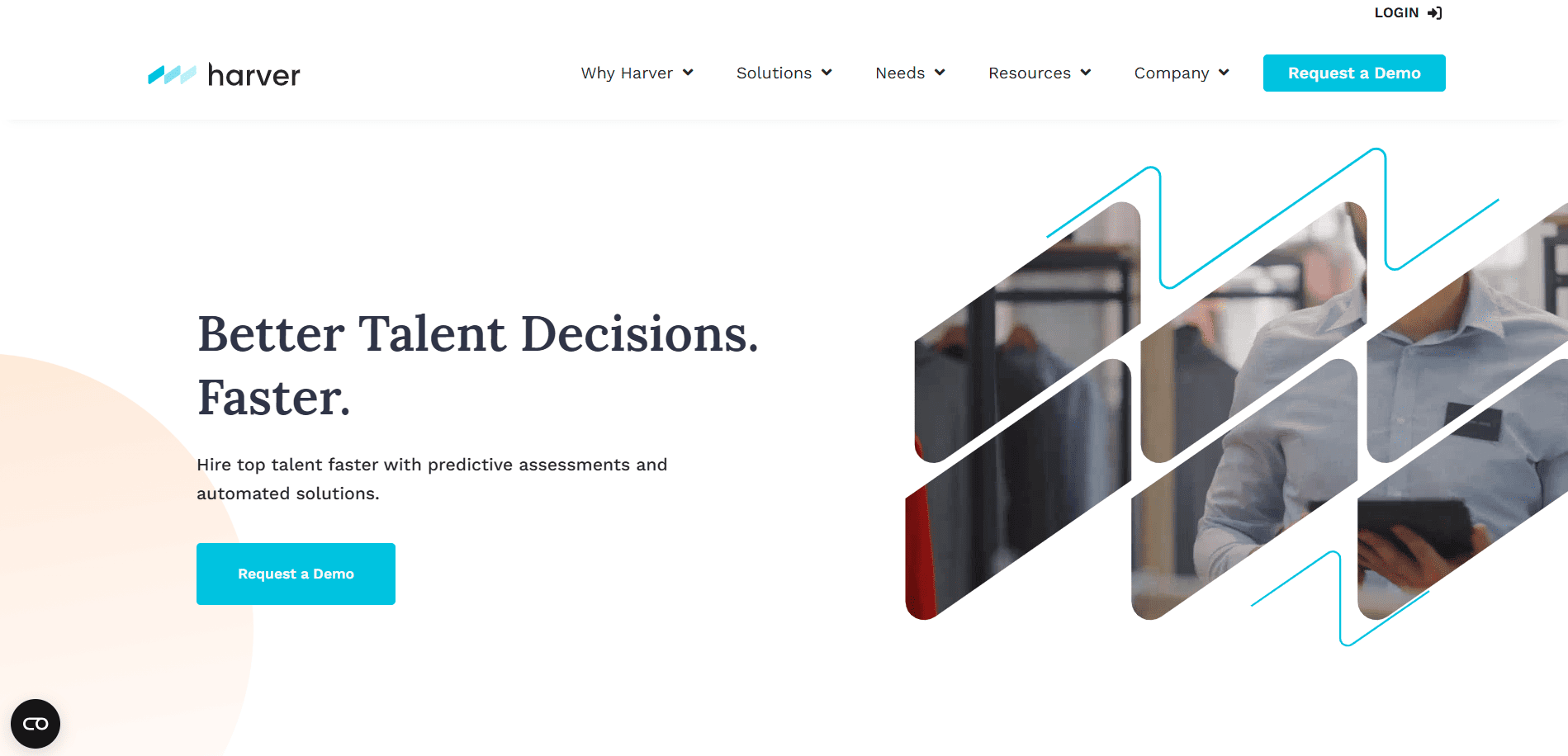
Source: Harver
It is a candidate assessment tool that is based on an AI algorithm that is used to determine the credibility and quality of the performed hire. This is a tool that successfully measures the candidates’ cultural fit, cognitive abilities, and skills to perform the role. The tool is best known for its specialization in volume hiring.
Key Features:
- It is best for reducing employee turnover
- Gives you valuable data that helps build your organization
- Offers end-to-end automation for manual tasks in the hiring process
3. ThriveMap
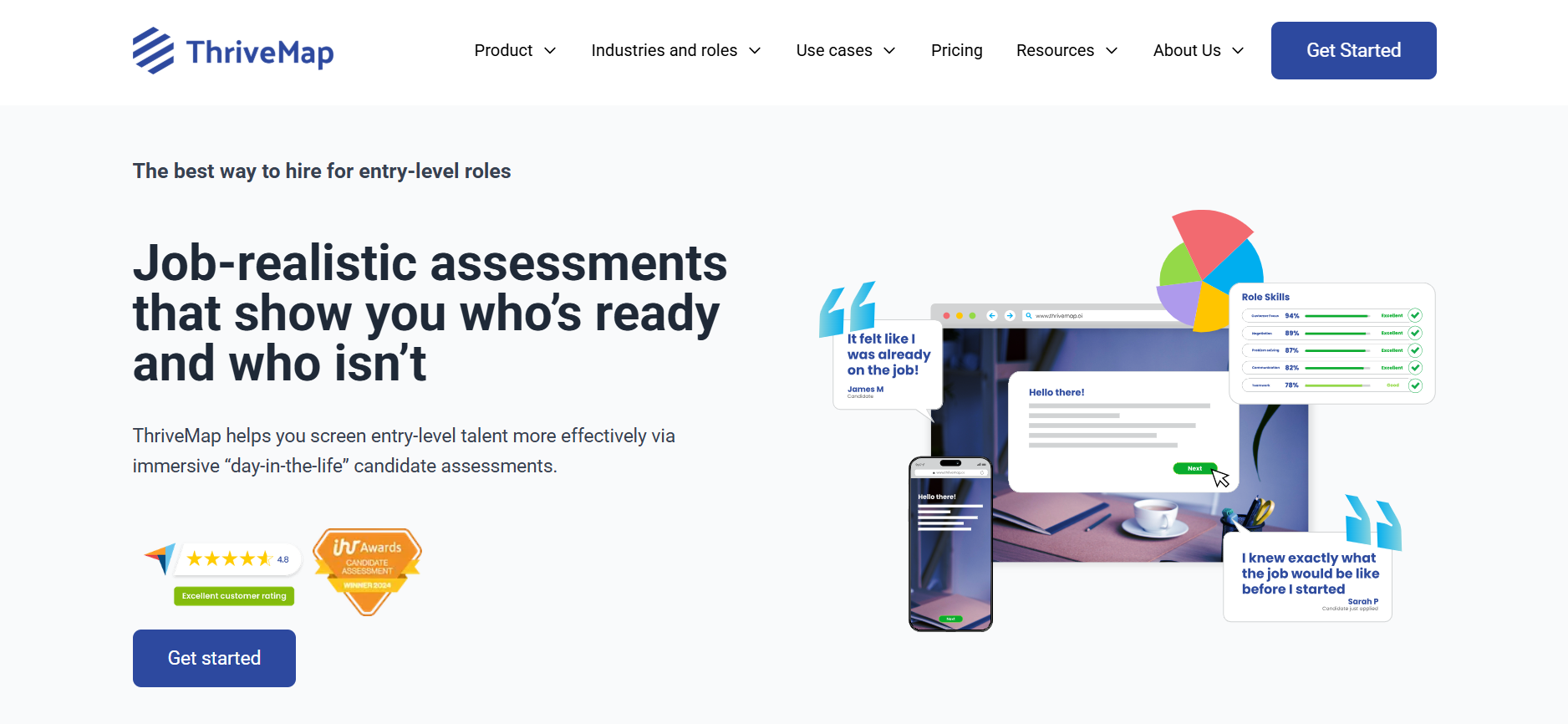
Source: ThriveMap
ThriveMap also focuses on rendering a high volume of hiring. The platform uses a virtual “day in the office,” which is a part of their assessment toolkit. They take the candidates through a simulation of a day in the office and determine if they are fit for the role and the organization.
Key Features:
- The platform offers ATS integration
- Acquire feedback score for every candidate
- The tool offers an automatic and authentic screening experience to both users and candidates
- Unique candidate experience with “day in the office”
4. Maki
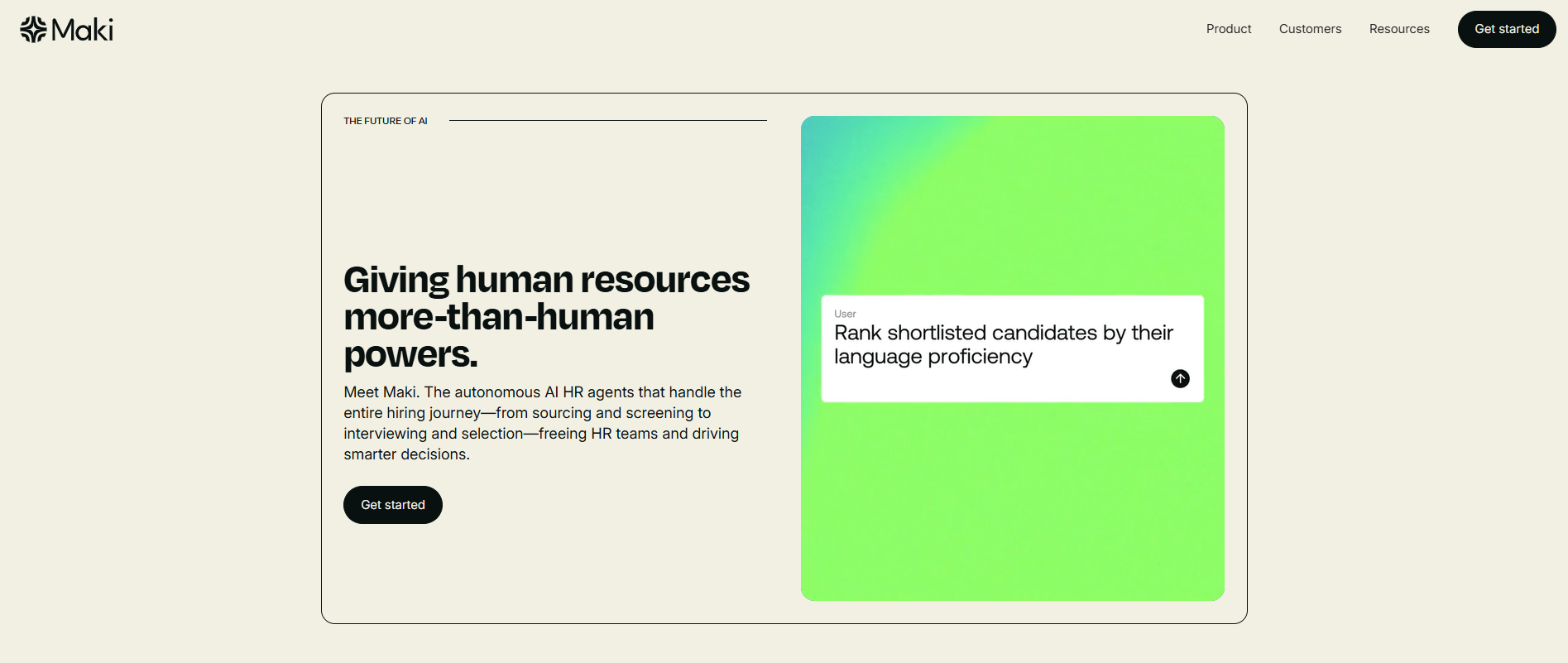
Source: Maki
Maki is an intuitive and modern pre-employment assessment platform designed to improve candidate experience while delivering deep insights for recruiters. It offers over 200 ready-made tests covering cognitive abilities, personality, and job-specific skills. Maki emphasizes candidate-friendly design, quick test delivery, and rich data analytics, making it a preferred choice for companies seeking efficiency and accuracy.
Key Features:
-
Offers 200+ pre-built tests for cognitive, behavioral, and technical skills
-
Mobile-friendly interface with gamified questions for a smoother candidate experience
-
Provides real-time reporting and easy integration with popular ATS platforms
5. Qualified
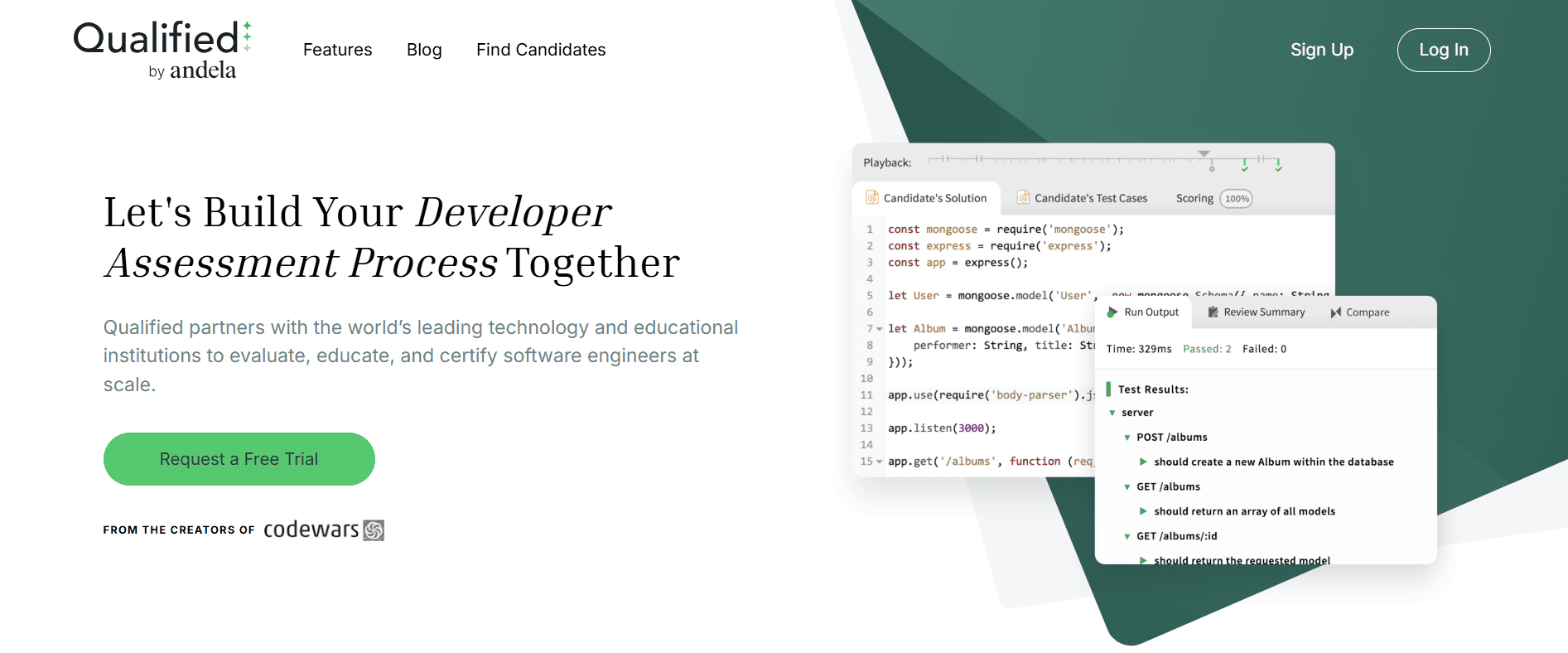
Source: Qualified
Qualified is a specialized assessment tool for technical roles. It offers effective solutions for coding assessments and other programming abilities. It also provides to constructively streamline the hiring process by shortlisting top talents.
Key Features:
- The platform offers specialized coding assessments for coders.
- The grading system in this platform is automated and allows real-time collaboration.
- The assessments also allow customization.
6. HR Avatar
![]()
Source: HR Avatar
It is a “whole person” test, which gives detailed insights into the candidate’s caliber as a whole. It gives its users specific and customizable test templates that focus on factors that are essential for that particular role.
Key Features:
- The platform offers video interviews
- The tools successfully support remote proctoring
- It is a user-friendly platform that allows easy navigation for the users.
7. Workable
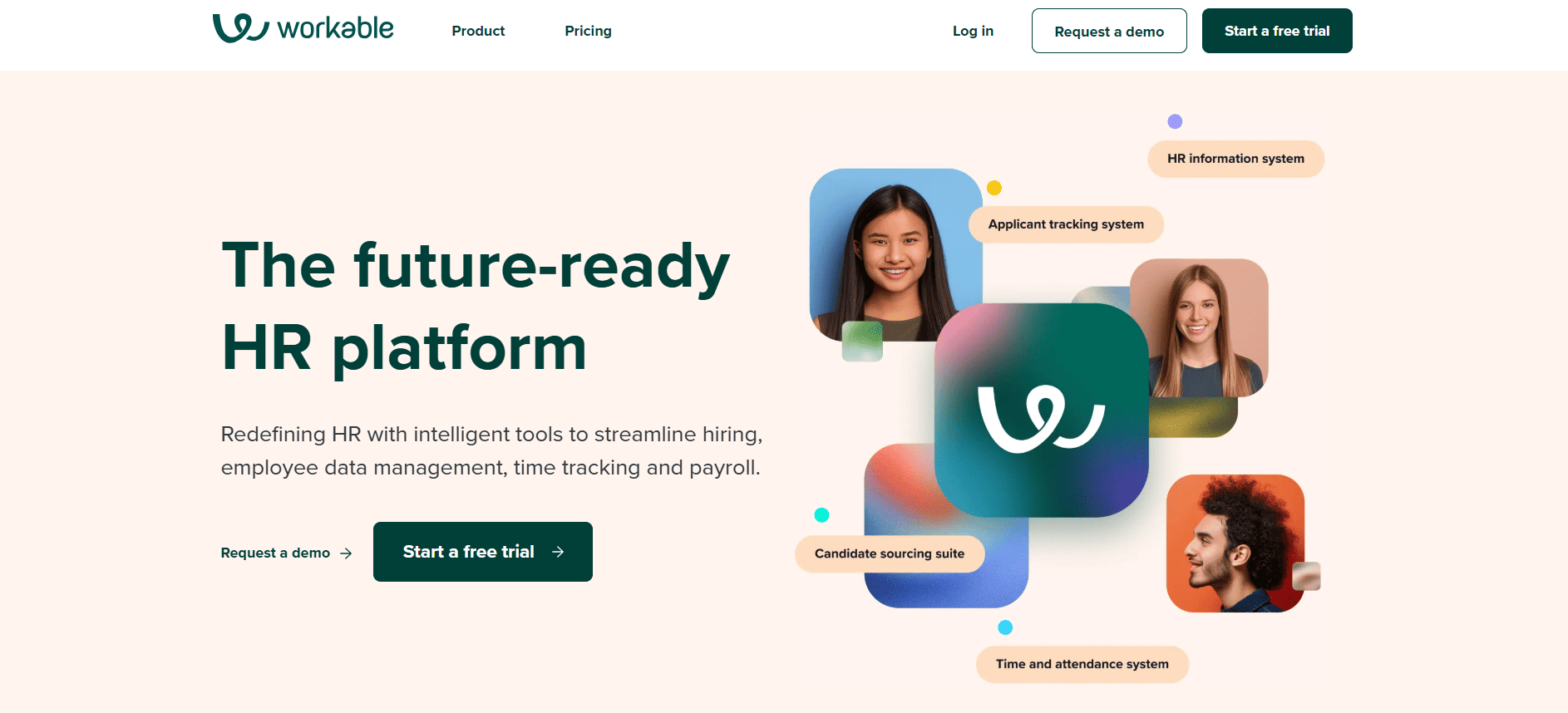
Source: Workable
An easy and enjoyable user interface is the promise that Workable offers to its users. It is one of the most popular tools available for recruitment and effectively allows collaboration and integration with external applications effortlessly. This will allow us to find and develop the right candidate.
Key Features:
- The software supports mobile applications
- The tool also performs an automatic evaluation of the tests conducted.
- There is expert advice available that assists hiring managers in preparing the test.
8. Teamable
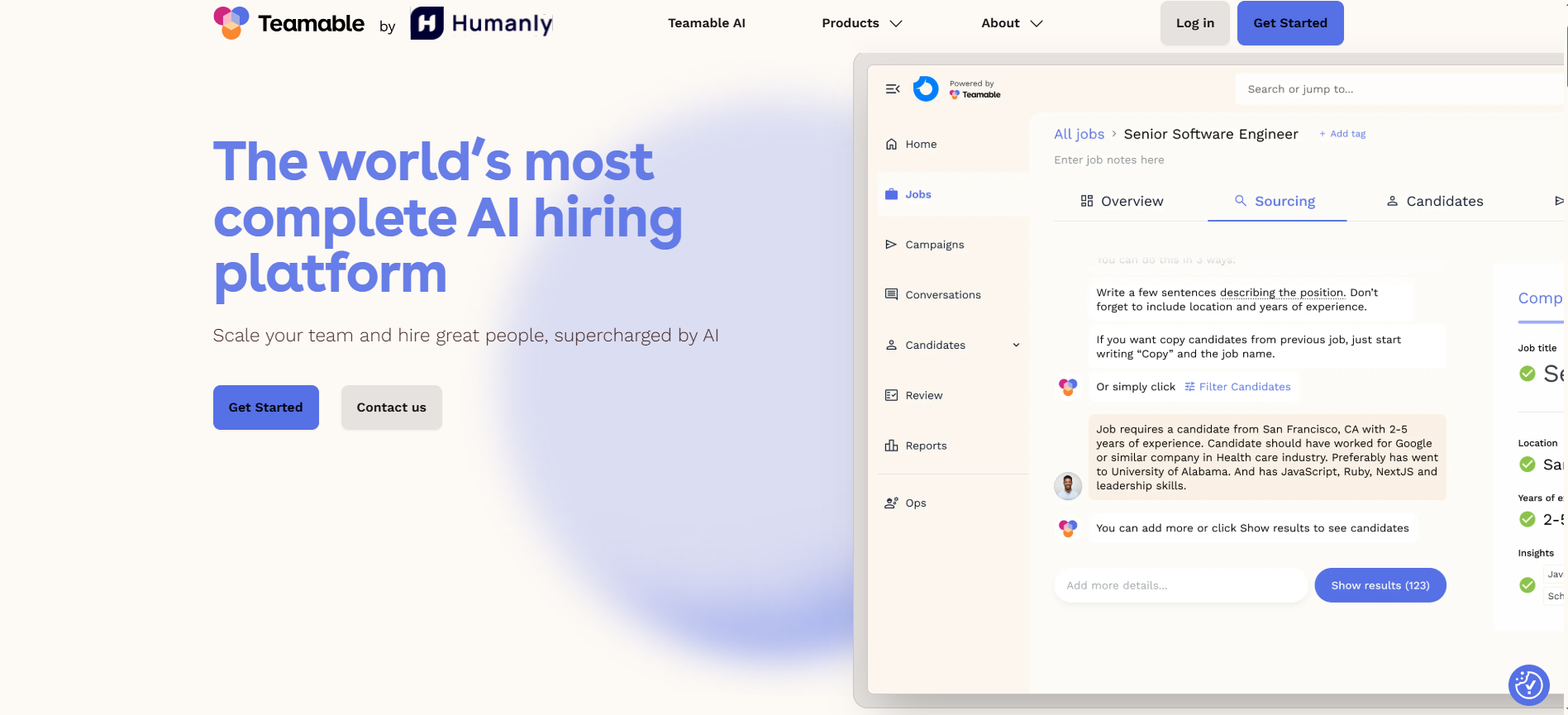
Source: Teamable
Teamable is a unique platform that allows hiring managers to filter out suitable candidates from the existing employee networks. Teamable world on the idea that the candidates screened through such a process are more likely to listen to someone they trust. This lands the organizations on the right talent.
Key Features:
- The platform offers effective communication management.
- It ensures seamless onboarding that only focuses on top talent.
- The application also allows performance tracking of each candidate.
- It provides automated assessments, reports, and analytics
9. Xobin
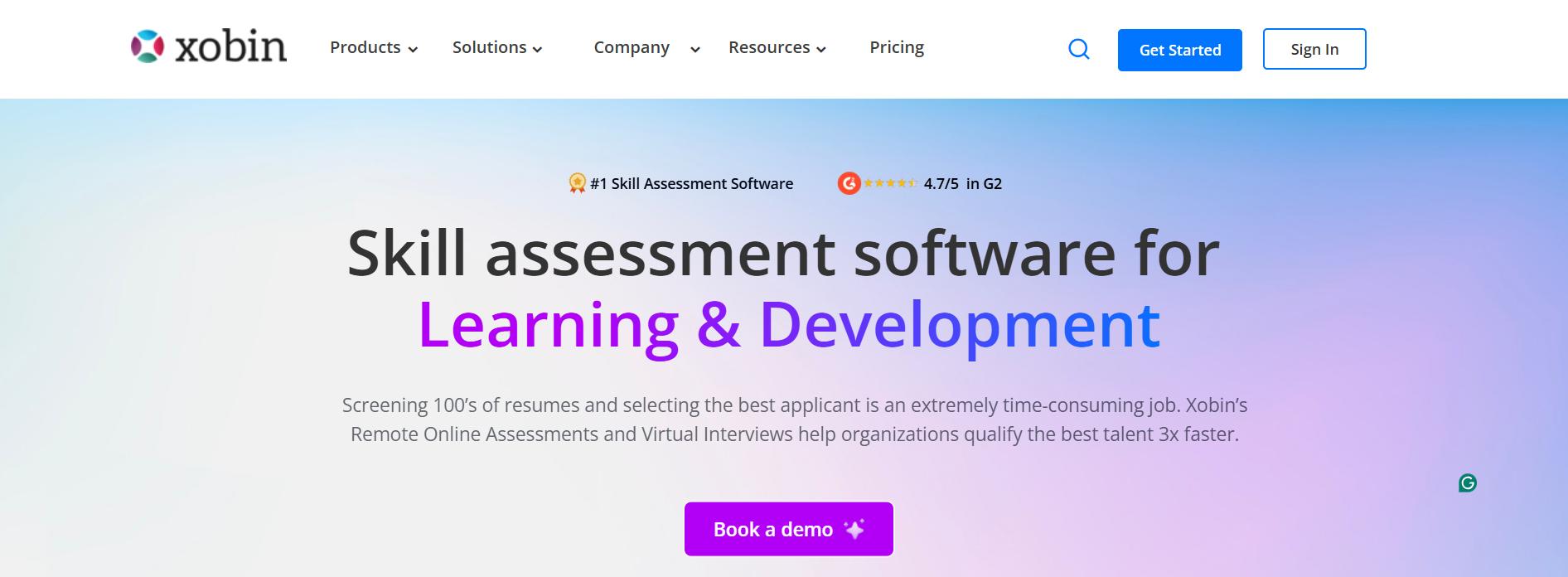
Source: Xobin
Xobin is a platform that works wonders in hiring the most apt candidates. The tool works on smart workflows that enable users to conduct pre-hire tests, psychometric tests, video interviews, etc.
Key Features:
- The platform offers a simple subscription plan to its users.
- It supports unlimited candidate screening
- It has the feature of one and two-way video interviews
10. HiPeople
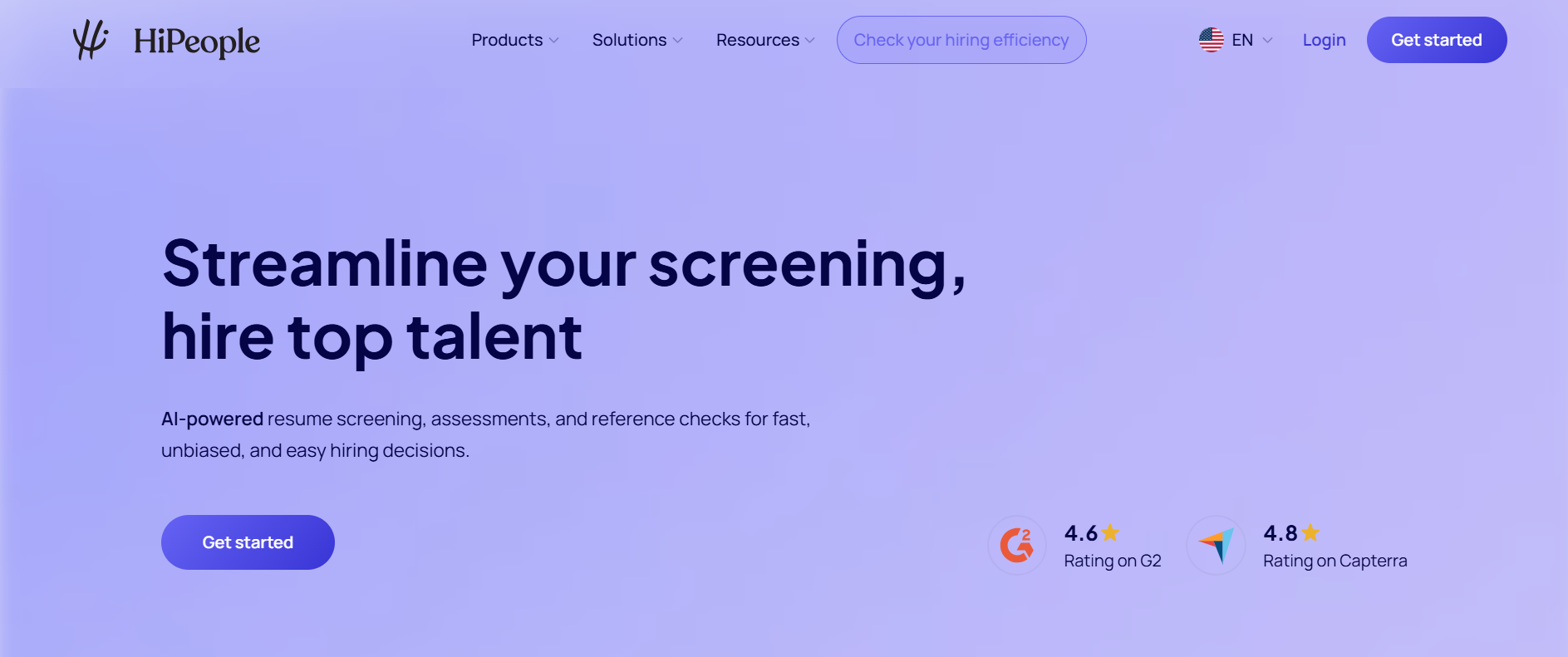
Source: HiPeople
HiPeople is a cutting-edge hiring intelligence platform that helps companies automate candidate referencing and gather in-depth insights through scientifically backed assessments. Designed to enhance both speed and quality in the hiring process, HiPeople enables recruiters to create talent profiles that go beyond resumes by incorporating behavioral data, reference feedback, and hard skill evaluations.
Key Features:
- Offers science-backed assessments for soft and hard skills
- Automates candidate referencing for faster decision-making
- Provides enriched candidate profiles to improve quality-of-hire
Here is a comparison table of all the tools –
| Tool | Key Strengths | Best For | Notable Features | Pricing Info |
|---|---|---|---|---|
| Skillrobo | AI-powered assessments, customizable tests, built-in ATS | All industries, technical and non-technical roles | 100+ test templates, Seyarc AI, role-based tests | From $149/month, 14-day free trial |
| Harver | AI for volume hiring, cultural fit assessments | High-volume hiring for retail, hospitality, services | End-to-end automation, predictive analytics | Custom pricing |
| ThriveMap | Realistic job previews, day-in-the-life simulations | Roles needing cultural fit and expectations matching | ATS integration, customized scenarios | Custom pricing |
| Maki | Pre-built tests and strong candidate experience | SMBs and fast-scaling teams | Gamified interface, mobile support, 200+ assessments | Freemium model, custom pricing |
| Qualified | Specialized coding assessments | Technical and programming roles | Real-time collaboration, customizable coding tests | Custom pricing |
| HR Avatar | Whole-person assessments, video interviews | Comprehensive role assessments | Remote proctoring, customizable tests | Starts around $95 per test |
| Workable | Integrated ATS with assessments | General hiring across industries | Mobile-friendly, automatic evaluations | From $149/month |
| Teamable | Social network referrals and hiring | Referral-based hiring programs | Automated sourcing, communication management | Custom pricing |
| Xobin | High-volume candidate screening, psychometric tests | SMBs and startups need fast hiring | Unlimited candidate screening, one/two-way interviews | Starts around $199/month |
| HiPeople | Predictive hiring and enriched candidate profiles | Data-driven hiring and quality-of-hire improvement | Automated reference checks, assessment scoring | Custom pricing |
Conclusion
Candidate assessment tools are an essential element of the recruitment process. It can sharpen and enhance the process, redefining the candidate shortlisting approach. Skillrobo has proven its expertise in doing so, heightening both the user and candidate experience. This brings in real-time insights into each candidate and carves out the competencies you are looking for. Acquire consistency and legitimacy in the hiring process through promising candidate assessment software like Skillrobo. Empower your hiring today.
Sign up now!

Key Takeaways
-
Candidate assessment tools streamline hiring by objectively evaluating skills, experience, and personality, reducing bias and improving hiring accuracy.
-
Organizations using pre-employment assessment software report faster hiring cycles, higher retention rates, and better candidate-job fit.
-
Choosing the right tool matters—factors like integration capabilities, customizable templates, anti-fraud features, and skill-specific tests can significantly impact hiring outcomes.
-
Skillrobo offers a comprehensive solution for creating customizable assessments, tracking candidates efficiently, and ensuring a seamless hiring process across industries.
New technologies are redefining how hiring processes are carried out. There has been an exponential increase in the number of applicants applying for a single job posting, making it difficult for hiring managers to hire the best. Employers constantly look for ways to attract the best-skilled candidates to suit the role perfectly. This laborious task has been greatly simplified by implementing candidate assessment tools.
These tools, which are specialized in filtering out suitable candidates, stand as a one-stop solution for any hiring process across any industry. Today, candidate assessment software has become a must-have, no matter the size of your organization. Let us dig further to know how to implement and use one effectively.
What are Candidate Assessment Tools?
In the current scenario, the hiring managers no longer sit for long hours to scan through CVs. With advanced products like candidate assessment tools, the complexity of the process has been reduced to a great extent, making the hiring process faster than before.
So, what is a candidate assessment tool?
A candidate assessment tool is a pre-employment screening software that is used to aid hiring managers in efficiently shortlisting and choosing the best candidates for a particular job role. As an assessment software, it allows users to examine and filter applicants based on the results obtained from the tests. The following grounds can be assessed through a given candidate assessment test:
- Skillset
- Mindset
- Personality
- Character
- Work experience
- Knowledge
- Education
These hiring assessment tools deliver a variety of features that cover a wider range of cognitive abilities and personality tests that will help gauge the candidates’ ability to contribute to the company’s growth. Pre-employment testing tools exponentially increase precision in hiring and decrease errors and expenses.
Who Uses Pre-Employment Testing Software?
Any organization, small or large-scale, that is struggling to find the right fit for the job roles can implement pre-employment testing software. An assessment tool like this would streamline the recruitment process, elevating and optimizing the complete experience of hiring. A systematic and standardized approach is summoned and lets organizations land on the right candidate.
Why Use Candidate Assessment Tools?
Candidate assessment software comes with multiple advantages. These advantages enable the recruiters to comprehend the abilities of each candidate, rank them accordingly, and go for the final selection. 82% of U.S. companies use some form of pre-employment testing to assess candidates’ skills and personality traits. Hence, here are some reasons why it is essential to adopt a candidate assessment tool for hiring:
1. Conventional CV Screening is Pointless
Years before, the number of candidates that applied to a job opening was few and limited, and the segregation of applications was done by the recruiters themselves. It was possible to invest a long period in doing so. But today, there has been a steady rise in the number of applicants, and human screening is no longer applicable. Candidate assessment tools can easily do that for you. Instead of just glancing at the CVs, let the software do the appropriate level of detailed screening and find the right candidate.
2. Removes Biases and Focuses on Skills
It is an undeniable fact that biases affect the efficacy of filtering applicants. But when the filtering is achieved using pre-employment tests, the candidates are only graded based on their skills and experience. This can be achieved easily as the metrics will be set in the software, thus removing any sort of biases. This enables the process to be more reliable and legitimate. Finding the right applicant is always crucial to extracting the maximum proficiency for the role.
3. Confidence in the Hiring Process
A pre-employment assessment tool will provide you with accurate assessment results and values so that your company’s hiring manager will have the confidence to choose the right candidate. No accusations can be made against them or the company. It is all based on the performance of the candidates alone.
4. Develop a Strong Team
Since the focus is completely on the candidate’s skills, a robust and diverse team can be built using the candidate’s data. At the same time, the candidate’s strengths and weaknesses can be studied and accordingly placed in the right team. This way, a suitable candidate is placed on the right team, which further boosts the performance.
5. Managers can successfully prepare
When the candidate data is available to the team manager, they can clearly understand what the candidate can or cannot do. This way, the candidate can be appointed to the appropriate job role and team.
Benefits of Candidate Assessment Software in Recruitment
Companies that automate candidate assessments report a 24% reduction in overall time-to-hire. Several benefits come with candidate assessment tools. If you aim to locate and land the right candidate for your organization, candidate assessment software can simplify the process for you. Let us dive into some of the important benefits that you acquire with a candidate assessment tool.
1. Improved Employee Retention
With a recruitment tool, you can always focus on recruiting suitable candidates. These candidates who are the right fit for the role tend to be productive as they understand their job roles with utmost clarity. Hence, the chances of their retention are high.
2. Saves Time Spent on Recruiting
The tool will guide employers to shortlist the most suitable candidates instantly after the test. Hence, the entire recruitment process improves and is completed faster. This saves a lot of time and energy and simultaneously enhances accuracy in the process as well.
3. Zero Biased Assessment
As discussed above, a pre-employment test focuses on the candidates’ skills and other factors like qualifications, experience, and cognitive abilities. With these parameters as the criteria, it is data-driven, and there is zero chance of bias.
4. Screen More Candidates
One of the greatest advantages of using pre-employment software is its ability to screen a large group of candidates simultaneously. Eventually, only the candidates who clear the test will be considered for the interviews that follow.
5. Improved Productivity
When the most skilled and apt candidates are finally part of the team, the employee engagement rate heightens which further pushes the productivity of the team.
6. Highly Cost-Effective
The amount of resources used falls drastically with the implementation of a candidate assessment tool. The test is bought only once by the organizations. This can be distributed and used among hundreds of users and applicants. Built-in tests are readily available, and even new tests can be created from the elements available in the software itself. Employers do not have to access anything from any other source. Hence, it is highly cost-effective.
7. Scalable Solution
The hiring assessment tools are highly scalable. Let the number of candidates be 10 or even 100, these can be used effectively by just sharing the test link with the candidates. The process is escalated to a high speed that the hiring manager finds it easy to find the right employee with high precision.
Types of Candidate Assessment Tools
Candidate assessment software is one of the most flexible hiring assessment tools that can be used for recruiting the best candidates across any industry. Different kinds of pre-employment assessment software can cover a wide range of job-related skills and soft skills, including areas like problem-solving abilities, motivation, communication, etc. Some of the most common types of candidate assessment tools are as follows:
1. Skills Tests
The skills tests are assessments that are specifically used for assessing the role-based skills of the candidates. According to each role, the skill sets to be judged change. For example, for programmer-based roles, the candidates are assessed based on their programming language skills. Similarly, for the role of a content writer, the candidates will be assessed for their writing skills. This will give the hiring managers deep insights into the abilities of a candidate.
2. Personality Tests
A pre-employment assessment test can measure the candidate’s personality traits along with the performance of a job-related role. When working in any role, it is important to hire a person with good personality traits so that they will match your organizational culture.
3. Integrity Tests
As a type of personality test, integrity or honesty tests are most commonly used in the retail and financial service industries. This is generally used to ensure integrity since, in these industries, employees are left unsupervised and they might have access to the products or handle cash.
4. Soft Skills Tests
In soft skills tests, assessments based on communication, work ethics, problem-solving abilities, flexibility, and adaptability, etc., are carried out.
5. Aptitude Tests
Aptitude tests are similar to soft skills tests. These measure similar criteria like problem-solving, attention to detail, and the ability to analyze and process data and information. These types of tests offer a deep understanding of a candidate’s behavioral traits.
Skillrobo, our online pre-employment assessment tool with 100+ pre-built tests, is one of the best candidate assessment software tools, which offers a combination of all of the above-mentioned assessments.
How to Use Candidate Assessment Tools?
The recruitment assessment tools are best for organizations that practice quantifiable and objective methods of candidate screening, unlike most of the other traditional methods, like interviews, but they carry some drawbacks too. Hence, choosing the right combination of tests, conducting methods, as well as the right tools is essential.
Most often, several limitations like personality tests being considered a privacy invasion, or tests being discriminatory. Hence, using a pre-employment tool combined with the right methods of conducting the entire recruitment process, like the structured interview, is the best practice.
Possible Issues with Candidate Assessment Software
No recruitment software can be used blindly. Several aspects need to be considered before choosing and implementing one. In most hiring assessment tools, certain types of drawbacks are prevalent, and you need to be aware of them. Here are some common problems associated with candidate assessment.
1. No Objective Scoring
One common pitfall is when the software does not provide objective scoring for the assessments that are done. In the absence of an objective answer type, bias is most likely to be involved in the assessment process. Choosing a tool that offers no objective scoring and quantifiable results will fail you in screening the most suitable shortlisted candidates for you.
2. Assessing Video Responses
Not everything can be performed by software. Video responses are not an objective type of response. So features like video responses have to be assessed by a human only. From a video response, factors like speaking skills, energy level, motivation, and creativity can only be judged and assessed by a human.
3. HR Manager vs. Automation
First-time implementers often think that candidate assessment tools are a complete replacement for hiring managers. What they fail to understand is that these hiring assessment tools are not a replacement for hiring managers. Recruitment tools cannot automate every aspect of the hiring process. Most processes often need human initiation and judgment. Similarly, human intervention is inevitable in the hiring process, too. Automation aids in the process so that the recruiters can focus on important matters. Automation can take care of tasks like integration with other applications, distribution of the tests, and calculating the overall result of the test.
4. Having a Feedback System
What most software leaves out is a feedback provision within it. If you want to ensure a good candidate experience, then a feedback system is essential to maintain a good recruiter image and brand. With a feedback system, your organization can also improve the areas that are lacking or even make necessary changes to the software.
5. Laws Related to Personality Tests
It is unlawful to refuse to hire any candidate due to their race, color, nationality, sex, or religion. Even though the act does not prohibit employers from using personality or integrity tests, you must be aware that the decree is relevant when these tests are used to intentionally negate or discriminate against any person based on any grounds or expert advice on such matters, consider speaking with a legal consultant who specializes in employment law.
6. Race and Gender Discrimination
It is also illegal for an employer to tamper with the results by changing the scores, misusing the power and changing cutoffs, or altering the result based on the color, sex, race, religion, or nationality of a candidate.
7. Psychological Tests termed “Medical Examinations”
Based on guidelines provided by the U.S. Equal Employment Opportunity Commission (EEOC), employers are allowed to conduct psychological tests provided it is not deemed as “medical”. Psychological tests often turn medical when clinically based personality tests are developed to determine issues like depression or paranoia. This should not be used on candidates. It is always better to stick to personality and psychometric tests that study cognitive abilities to focus on the personality of the candidates.
8. Privacy of the Candidates
Most of the time, recruitment tests have been questioned for the invasion of privacy. This is a huge concern. The tests that employers conduct should not be too intrusive and should only be job-specific.
Choose the Right Type of Assessment Tool
Looking at the potential issues that could arise when using recruitment software, it is important to choose the right tool for this process. Technical hiring is completely different from regular hiring. The parameters are purely based on the skills, experience, and knowledge of the applicants. To carry this out perfectly, a proper tool that is flexible and capable of being inclusive with different tests has to be chosen. Doing so will make it easier for you to focus on filtering the right candidates.
Choosing a tool can be based on different criteria, and this can vary from organization to organization. Among them, one criterion can be choosing a tool based on a skill that you are assessing.
For example, if you are looking for coders, then you can choose tools that are specifically designed to examine coding abilities. Similarly, for sales executives, respective hiring assessment tools that support sales for tests can be implemented. To understand and choose the best one, it is important to familiarize yourself with the common features.
Important Features in Candidate Assessment Software
Every pre-employment software contributes a different set of features to its users. Here are some of them to have an idea about some basic features.
1. Prebuilt Test Templates and Skills Challenge
Most of the hiring assessment tools support readily available test templates in the software. These in-built test templates with predetermined patterns of questions will aid the hiring managers in the shortlisting process. They can save time by avoiding sitting and choosing questions for the test.
2. Customizable Templates
An additional advantage most platforms offer is the customization of these templates or skill challenges. The feature of customization can be used to change question patterns and types, or even alter the difficulty level according to the expertise and experience of the candidates.
3. Integration
Integration is a crucial aspect when it comes to online assessment tools. Employers often use external software like Applicant Tracking System (ATS), applications for automated emails, background screening, and several others. The users must be able to use all of these together seamlessly. To achieve this, it is mandatory to go for a tool that allows integration.
4. Built-in ATS
Skillrobo is a platform that has a built-in Applicant Tracking System. This makes the streamlining much simpler, and employers do not have to look for a good tracking system. Opting for Skillrobo will provide you with everything in one place.
5. Expert Guidance
Some platforms offer specialized experts to guide HR managers/professionals in constructing an effective job assessment workflow for specific roles.
6. Pricing
The tool must be cost-effective. You have to check whether you are paying for the right features that complement your organization and the hiring process. Look for tools that will acquire the required talent pool that you are looking for.
7. Hiring at Scale
An effective hiring tool must be able to improve your hiring scale and simultaneously build a skilled and professional workforce for your organization. With such a tool in place, you can increase the volume of candidates to undergo initial shortlisting and allow you to focus on interviews.
8. Anti-fraud Mechanism
An assessment tool must be able to have an in-built anti-fraud mechanism to prevent cheating while conducting the tests. This feature will ensure credibility and fairness as it negates malpractices like plagiarism, impersonation, sharing answers, or any fraudulent activities. An anti-fraud mechanism will allow the recruiters to practice advanced proctoring of the tests.
Some other additional and essential features include:
- Different types of tests within a single software
- Offers exceptional candidate experience
- Availability of important and common metrics and crucial analytics features
Top 10 Best Assessment Tools for Recruitment
Explore the top 10 best candidate assessment tools for an elevated recruitment experience.
1. Skillrobo

Skillrobo is the best candidate assessment software available in the market. It is an AI-powered, all-encompassing, and comprehensive recruitment tool that will aid you in hiring skillful and proficient candidates to add professional value to your organization. It is a tool that specializes in psychometric assessment and pre-assessment solutions for any business organization. A wide range of tools and features incorporated in Skillrobo like personality and behavioral tests, cognitive ability assessments, and several others, provide a complete understanding and judgment of the candidates.
With such an impressive assessment tool in place, recruiters can enjoy the wider scope and advantage that it offers them. Our platform allows the hiring managers to have in-depth insights into the abilities of each candidate and, at the same time, will be able to effortlessly manage and streamline the shortlisting process.
Key Features:
- Skillrobo focuses on and prioritizes the skills and talents of the candidates.
- The platform offers Seyarc AI, elevating the evaluation process.
- Different skills tests range across industries like BPOs, IT sectors, KPOs, the automobile industry, and many more.
- Our platform offers 100+ in-built test templates which fully customizable
- It also offers the provision to create role-based tests and choose your preferred difficulty level
- Acquire simple enterprise integration where you can directly upload test scores directly to your HR evaluation system and shortlist accordingly.
- Get hold of in-depth skills reports, where each candidate’s skills, strengths, and weaknesses.
- The platform is cost-effective and offers services at a wider price range.
2. Harver

Source: Harver
It is a candidate assessment tool that is based on an AI algorithm that is used to determine the credibility and quality of the performed hire. This is a tool that successfully measures the candidates’ cultural fit, cognitive abilities, and skills to perform the role. The tool is best known for its specialization in volume hiring.
Key Features:
- It is best for reducing employee turnover
- Gives you valuable data that helps build your organization
- Offers end-to-end automation for manual tasks in the hiring process
3. ThriveMap

Source: ThriveMap
ThriveMap also focuses on rendering a high volume of hiring. The platform uses a virtual “day in the office,” which is a part of their assessment toolkit. They take the candidates through a simulation of a day in the office and determine if they are fit for the role and the organization.
Key Features:
- The platform offers ATS integration
- Acquire feedback score for every candidate
- The tool offers an automatic and authentic screening experience to both users and candidates
- Unique candidate experience with “day in the office”
4. Maki

Source: Maki
Maki is an intuitive and modern pre-employment assessment platform designed to improve candidate experience while delivering deep insights for recruiters. It offers over 200 ready-made tests covering cognitive abilities, personality, and job-specific skills. Maki emphasizes candidate-friendly design, quick test delivery, and rich data analytics, making it a preferred choice for companies seeking efficiency and accuracy.
Key Features:
-
Offers 200+ pre-built tests for cognitive, behavioral, and technical skills
-
Mobile-friendly interface with gamified questions for a smoother candidate experience
-
Provides real-time reporting and easy integration with popular ATS platforms
5. Qualified

Source: Qualified
Qualified is a specialized assessment tool for technical roles. It offers effective solutions for coding assessments and other programming abilities. It also provides to constructively streamline the hiring process by shortlisting top talents.
Key Features:
- The platform offers specialized coding assessments for coders.
- The grading system in this platform is automated and allows real-time collaboration.
- The assessments also allow customization.
6. HR Avatar
![]()
Source: HR Avatar
It is a “whole person” test, which gives detailed insights into the candidate’s caliber as a whole. It gives its users specific and customizable test templates that focus on factors that are essential for that particular role.
Key Features:
- The platform offers video interviews
- The tools successfully support remote proctoring
- It is a user-friendly platform that allows easy navigation for the users.
7. Workable

Source: Workable
An easy and enjoyable user interface is the promise that Workable offers to its users. It is one of the most popular tools available for recruitment and effectively allows collaboration and integration with external applications effortlessly. This will allow us to find and develop the right candidate.
Key Features:
- The software supports mobile applications
- The tool also performs an automatic evaluation of the tests conducted.
- There is expert advice available that assists hiring managers in preparing the test.
8. Teamable

Source: Teamable
Teamable is a unique platform that allows hiring managers to filter out suitable candidates from the existing employee networks. Teamable world on the idea that the candidates screened through such a process are more likely to listen to someone they trust. This lands the organizations on the right talent.
Key Features:
- The platform offers effective communication management.
- It ensures seamless onboarding that only focuses on top talent.
- The application also allows performance tracking of each candidate.
- It provides automated assessments, reports, and analytics
9. Xobin

Source: Xobin
Xobin is a platform that works wonders in hiring the most apt candidates. The tool works on smart workflows that enable users to conduct pre-hire tests, psychometric tests, video interviews, etc.
Key Features:
- The platform offers a simple subscription plan to its users.
- It supports unlimited candidate screening
- It has the feature of one and two-way video interviews
10. HiPeople

Source: HiPeople
HiPeople is a cutting-edge hiring intelligence platform that helps companies automate candidate referencing and gather in-depth insights through scientifically backed assessments. Designed to enhance both speed and quality in the hiring process, HiPeople enables recruiters to create talent profiles that go beyond resumes by incorporating behavioral data, reference feedback, and hard skill evaluations.
Key Features:
- Offers science-backed assessments for soft and hard skills
- Automates candidate referencing for faster decision-making
- Provides enriched candidate profiles to improve quality-of-hire
Here is a comparison table of all the tools –
| Tool | Key Strengths | Best For | Notable Features | Pricing Info |
|---|---|---|---|---|
| Skillrobo | AI-powered assessments, customizable tests, built-in ATS | All industries, technical and non-technical roles | 100+ test templates, Seyarc AI, role-based tests | From $149/month, 14-day free trial |
| Harver | AI for volume hiring, cultural fit assessments | High-volume hiring for retail, hospitality, services | End-to-end automation, predictive analytics | Custom pricing |
| ThriveMap | Realistic job previews, day-in-the-life simulations | Roles needing cultural fit and expectations matching | ATS integration, customized scenarios | Custom pricing |
| Maki | Pre-built tests and strong candidate experience | SMBs and fast-scaling teams | Gamified interface, mobile support, 200+ assessments | Freemium model, custom pricing |
| Qualified | Specialized coding assessments | Technical and programming roles | Real-time collaboration, customizable coding tests | Custom pricing |
| HR Avatar | Whole-person assessments, video interviews | Comprehensive role assessments | Remote proctoring, customizable tests | Starts around $95 per test |
| Workable | Integrated ATS with assessments | General hiring across industries | Mobile-friendly, automatic evaluations | From $149/month |
| Teamable | Social network referrals and hiring | Referral-based hiring programs | Automated sourcing, communication management | Custom pricing |
| Xobin | High-volume candidate screening, psychometric tests | SMBs and startups need fast hiring | Unlimited candidate screening, one/two-way interviews | Starts around $199/month |
| HiPeople | Predictive hiring and enriched candidate profiles | Data-driven hiring and quality-of-hire improvement | Automated reference checks, assessment scoring | Custom pricing |
Conclusion
Candidate assessment tools are an essential element of the recruitment process. It can sharpen and enhance the process, redefining the candidate shortlisting approach. Skillrobo has proven its expertise in doing so, heightening both the user and candidate experience. This brings in real-time insights into each candidate and carves out the competencies you are looking for. Acquire consistency and legitimacy in the hiring process through promising candidate assessment software like Skillrobo. Empower your hiring today.
Sign up now!



